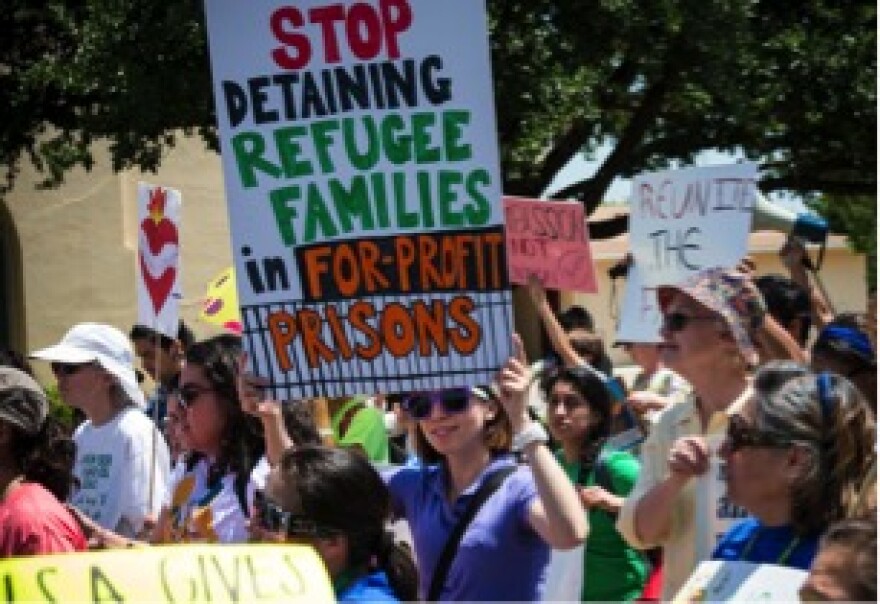President Obama expanded use of family detention camps a couple of years ago to include lockups for thousands of Central American women and children seeking asylum at the Southern border. That’s been a gold mine for the corporate prison industry. Private prison giant CoreCivic--formerly known as the Corrections Corporation of America--has put up record profits running a 2,400-bed family jail in the tiny city of Dilley. But some in Dilley worry hosting the hub of a controversial family detention policy hasn't paid off for locals.
Dilley native Gilbert Ortiz stares blankly at his hometown’s humble main drag from a nearby park.
“Well, in general, the whole town is dead,” says Ortiz. “There’s nothing here. This used to be a very big agriculture town. They called it the watermelon capital; you can see the watermelon there.”
Ortiz points to the hard-to-miss statue of a half-eaten watermelon—wrapped in Christmas lights. Today, Dilley is known for other things.
“Mainly oil and incarceration, says Jose Asuncion, a third-generation Dilley resident. By incarceration, he means the state prison and the so-called family detention center packed with immigrant women and children. Between the two of them:
“That’s 3,700 potential incarcerated people,” says Asuncion. “That’s equivalent to the town’s population. I think that’s wrong.”
Immigration authorities hastily opened the largest immigrant detention center in the country here 2 years ago, in an old oil worker ‘man camp’ at the edge of town.
“The headline in the paper was ‘Feds May Ok Internment Camp At Dilley,’” says Asuncion. “And the sub headline was ‘Opportunities for Employment.’”

The Dilley City Council approved its agreement with the private prison company and the man-camp owner in October 2014. CoreCivic agreed to prioritize hiring Dilley residents to fill 600 jobs, but Asuncion hasn't seen that.
“I’ve met a bunch of people that have applied for jobs there and didn’t get them because they do rigorous background checks and credit checks,” says Asuncion. “We’re a town that’s going through an oil bust, so of course a lot of the people here are not going to have good credit.”
The council’s agenda promised the project would provide $6.9 million in direct economic benefit to Dilley, but it's unclear that's come through. The agreement--and appraisal district data--show the city should have brought in less than $2 million in revenue sharing from CoreCivic and property taxes from the center since then.
Dilley has also taken out millions in bonds called certificates of obligation—without voter approval—for city projects including a water and sewer line upgrade for the detention center.

Noel Perez jokes he’s “in the unenviable position of being city administrator for the city of Dilley.”
Perez says there’s no doubt the massive detention facility is good for Dilley. It filled some of the void left by declining industries.
“Oil has taken a drastic fall and I’m glad for our diversified economy,” says Perez. “Where they brought that in from, I don’t know. All I know is that the 300,000 square feet went up in a hurry. That’s all I know.”
He admits the city put on $5 million in debt in 2014 to complete projects including the water and sewer upgrade for the detention center.
The Department of Homeland Security claimed it was reviewing its use of private prison operators altogether, but that review didn't stop the agency from approving a contract for the Dilley facility that keeps the center running until 2021, but Perez says an executive order could change that.
“Of course I see the positive in any agreement that’s—we’re going to re-up for 5 or 6 years or whatever,” says Perez. “But the thing is you just have to wait until Jan. 20, see what the new president is going to do. We may differ. We feel that we need the facility. The president may say the facility is costing a bunch of money. I’m sure it is. But, what the heck, what do you do?”
In the new contract, CoreCivic agreed to cut costs at Dilley by 40 percent, mostly through reductions in staff. A woman who works for a CoreCivic subcontractor says her pay was cut by more than 30 percent.
“Everybody was dropped to $16-something-an-hour,” she says. “Everybody quit in our company. I’m serious. Everybody quit. That’s when I called them and said, ‘I can’t afford my rent here at 16 something.”
The woman doesn’t want to be named because she just took a job with the same company in another state.
CoreCivic is advertising starting wages of $16.43 an hour in the local paper. The company can't say how many of its workers are from Dilley, but the woman says it’s just a handful. She also says her colleagues quit as a record surge of Central American immigrants entered the country.

“From what I gather, a lot of people were putting in a lot of overtime, because they just didn’t have the manpower, and it makes you wonder if everybody is even getting processed properly,” she says.
While city leaders hold out hope the controversial facility will pay off for Dilley, some residents feel used. Jose Asuncion doesn’t want his neighbors paying sky-high tax and water rates to pad private prison profits.
And as the son of a Salvadoran immigrant, says the plight of detainees is personal.
“At a different time, different decade not too long ago—in my lifetime, I could have been one of the kids there,” Asuncion says.
Meanwhile, federal immigration officials are struggling to find other South Texas towns willing to build a new facility to detain women and children. Community push-back killed proposals in Dimmit and Jim Wells counties earlier this year.




